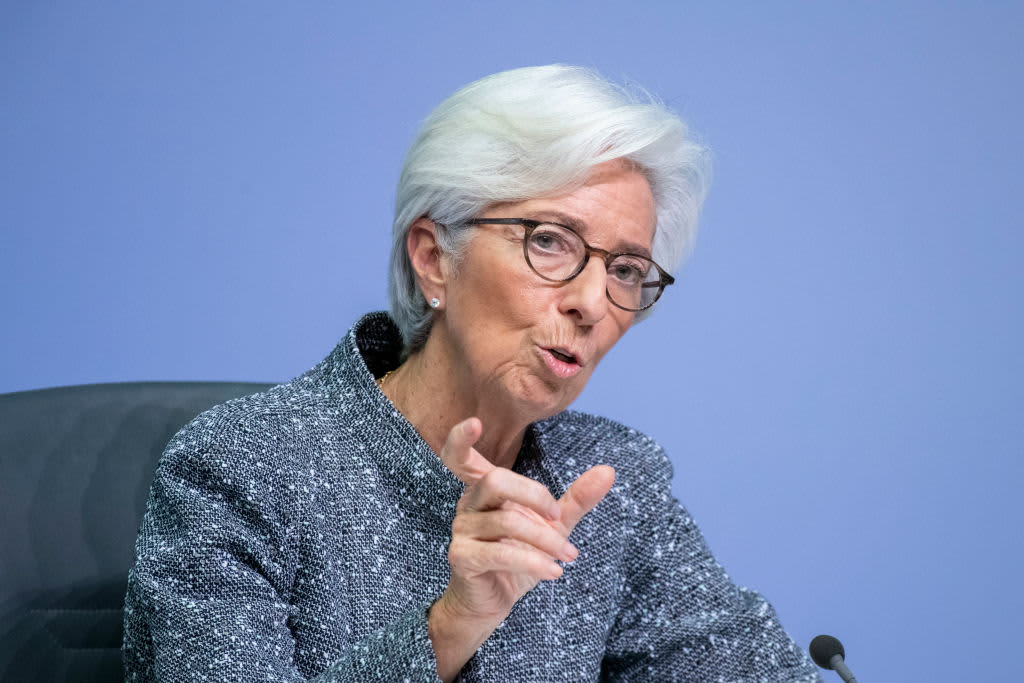Christine Lagarde, President of the European Central Bank, speaks to the media following a meeting of the ECB governing board.
Thomas Lohnes
Christine Lagarde, the first woman to head up the European Central Bank, has said she hopes young women today don’t have to experience sexism like she did early on in her career.
Lagarde was speaking with Ursula von der Leyen, the president of European Commission, on the ECB podcast Monday to mark International Women’s Day.
Reflecting on her early career, Lagarde said that while she was working on a deal at a law firm with a team of men as the only female partner, a client asked her for a coffee.
In response, Lagarde said she told him “Yes, of course but you’re going to get it yourself.”
“And he was like shellshocked and it took a couple of my associates to explain to him gently that I was not the secretary making coffee, I was actually the partner leading the team,” she said.
Lagarde also recalled another experience later on in her career, when she was France’s trade minister and had to undergo the “horrible exercise” of answering questions in front of parliament.
“And I remember walking to the podium where you have to answer the question and one senior member of parliament looking down on me and saying: ‘I wonder who she’s gone to bed with to be appointed to where she is,'” Lagarde said.
“So I went to see him afterwards to explain to him that I didn’t have to sleep with anybody to be where I was, and if he wanted to check my competence and skills he was more than welcome to ask me technical questions that I would be very happy to answer,” she added.
Lagarde went on to say that that she hoped young women “do not have (it) as bad as those experiences have been, thanks to all the work that you’ve done, that I’ve done, that many other women have done.”
In addition to being the first woman president of the ECB, Lagarde was also the first woman to be France’s finance minister and the first be the managing director of the International Monetary Fund.
Von der Leyen has also had a history-making career, becoming the first woman to be appointed as Germany’s defense minister and the president of the European Commission, the executive arm of the European Union.
In the podcast, von der Leyen said she became fed up with being repeatedly asked how she was able to balance childcare and being a government minister.
While working as Germany’s minister for family affairs, von der Leyen said she was once asked by a talk show moderator: “Have you already chosen whether you want to be a bad mother or a bad minister?”
Von der Leyen said she was shocked by the question and hoped attitudes had changed since then, however she recognized gender stereotyping still existed.
Self-confidence
Von der Leyen admitted that she felt self-doubt at the start of her career, however, particularly when it came to having both a career and a family. But she said she regretted feeling bad and came to realize that following her ambitions was also good for her family.
While working as a doctor, von der Leyen said that having a boss who requested she come back after having her first child helped her overcome those doubts.
“And if he had not said that, I don’t think I would have gone back into the job … the obstacles were, at that time in the mid-80s, insurmountable,” she said.
Von der Leyen added that moving to California after having her third child also helped, as it had better childcare provisions. “What I took from it was, it gives you an enormous of self-confidence and backing, if you have a supportive environment,” she said.
Lagarde agreed that “whoever helps you with confidence, whoever gives you the love, the affection, the expectations or the support that actually generates confidence is actually critically important.”
Meanwhile, von der Leyen added that it was important for people in leadership roles to instill confidence in the women they hire, as she felt when German Chancellor Angela Merkel first asked her to become a minister in her cabinet.
“My experience is that women tend to be hesitant, not to grab the opportunity too easily and it’s our responsibility, mainly as female leaders, to encourage them and to tell them ‘I believe in you, I’m sure you can do it and I’ll support you.’,” she said.
Don’t miss:
